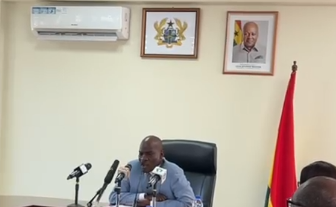The Minister for Education, Haruna Iddrisu, has proposed that Ghana consider a ten-year transition period, after which no private university will be allowed to operate in the country without a charter.
According to the Ghana Tertiary Education Commission (GTEC), only twenty-four private tertiary institutions in the country have been granted a charter.
Addressing the GTEC during the inauguration of the Commission, Haruna Iddrisu acknowledged the regulatory autonomy of the Commission but suggested that private universities must gradually be brought under stricter regulatory oversight.
"I have no power to interfere with your regulatory regime," he said. "There is strong demand from private universities, and they are awaiting my position on this matter. However, I don’t want to go against regulatory principles and values."
He continued, "The issue of compulsory charters should be looked at by your Commission. Even though it is not the intention of the Ministry or government to interfere with your regulatory mandate, questions have been raised as to whether the charter should be compulsory. As I consider your determination, I also want to remind private universities that they cannot remain independent forever. At some point, they must accept the need for regulatory guidance and support."
He further explained that, while this is not yet official policy, he believes a solution should be worked out, where every private university is given a moratorium, while still adhering to the current regulatory framework.
"Today is 2025, and Ghana will follow a roadmap that, in the next decade, as I have suggested, no private university will be allowed to operate without a charter. Between now and then, subject to those who qualify and are issued permits, the rest should prepare accordingly. In fact, we will likely need to work on strengthening their faculties as well".
He concluded by reaffirming his support for the Commission, stressing that "standards and quality should never be compromised in the name of affiliation with another institution."
"We are satisfied with the exercise of the regulatory mandate so far, but we must find a way to regulate those private universities."
Ultimately, we must ask ourselves how we can ensure access to higher education for all Ghanaians," he concluded.
Latest Stories
-
Prof. Bokpin backs GTEC’s sensitisation on use of honorary titles
1 hour -
Third suspect in Immigration Officer’s murder dies – Family says
2 hours -
Give Ghana’s fashion students the tech and software, not just the scissors – CEO of Seloart Group urges
3 hours -
Bryan Acheampong draws anger over ‘tribal campaign’ at NPP meeting
3 hours -
WAEC releases provisional 2025 BECE results
4 hours -
GOIL PLC clinches football trophy at 2025 JoySports Invitational Tournament
5 hours -
Bryan Acheampong condemned for using ‘tribal politics’ against Bawumia’s candidature
5 hours -
Bryan Acheampong highlights northern tribal dynamics that worked against Bawumia, NPP
5 hours -
Ghana and Japan strengthen bilateral business relations with new GIPC-JETRO agreement
5 hours -
Commemorating Ukraine’s Independence Day: A message from Ivan Lukachuk, Chargé d’Affaires of Ukraine in Ghana
6 hours -
Adutwum camp dismisses Global InfoAnalytics poll, claims strong grassroots support in NPP flagbearer race
6 hours -
Discard unfit presidential jet and procure a new one if possible – Prof Gyasi
6 hours -
Fire at Dodowa booster station disrupts water supply to parts of Accra
6 hours -
Cedi stability: The economy’s overreliance on forex problematic – Prof. Bokpin
6 hours -
Yorktown FC’s Lanzari Abdulai heads to Portugal for Atletico Clube Alcanenense trials
7 hours

